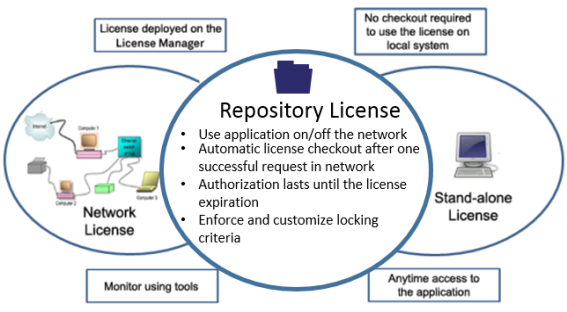License Properties Supported with Repository Licenses
A repository license inherits characteristics of both standalone and the network licenses and provides a unique licensing solution for certain category of users (see the diagram below).

The table following table provides more information about the license properties of repository licenses:
| Property | For a Repository License |
|---|---|
| Standalone/Network/Repository |
Repository only. To use repository licenses, your application must be linked with the integrated library for both network and standalone licensing. Only v8.0 (or later) of the Sentinel RMS License Manager and client library support repository licenses. |
| Long or Short-numeric |
Long only. A repository license cannot be in short numeric license format. |
| Check out |
Automatic. A license authorization can be checked out automatically (no manual check-out required like a commuter license) after the first successful license request from the License Manager. |
| Check in |
Manual. A license authorization needs to be explicitly checked into a License Manager when desired. |
| Remote check in/ check out |
No. A repository license can neither be checked out for a remote user nor can it be checked in by the remote user. |
| Maximum check out duration | A license authorization can be checked out till the time the license expires. |
| Trial or normal license |
Normal. A repository license cannot be used as a trial license. |
| Grace period | The repository license can be used on the local system. Therefore, there is no need to provide the grace period.. |
| Persistence-based license |
Yes. You must set up the persistence data for allowing use of repository licenses on your customer's local computer. Execute sntl_persistence_create API. For more information on how to call, compile and execute this API, refer the sample available at …\9.8\Samples\C\Src\sntl_lspmgmtinit.c path. For more details, refer to “Persistence Data-dependent License Models.” |
| License Locking | An authorization is locked to a portable computer using the local license request locking criteria. NOTE If no local locking criteria is provided, the license is locked to the default locking criteria 0x4 (Disk ID), See also: Use of Commute.dat File for Customizing Local Locking Criteria |
| Clock tamper detection-enabled |
Yes. To setup persistence data for the license, you must initialize the system for the specific feature-version before using it for the first time. |
| License revocation |
Yes. A repository license can be revoked. See also: Deferred Revocation of Commuter and Repository Licenses |
| Capacity licensing |
No. A repository license cannot have capacity associated with it. |
| VM detection flag | A repository network license can have the VM detection check associated. However, this check is not applicable to the tokens used on the local systems. |
| License sharing |
No. License sharing rules are enforced by the License Manager to network licenses (which may also be automatically commuted as a repository license). A repository license token on a local system acts as a standalone license and therefore sharing rules do not apply to it. |
| License holding |
No. License holding feature is useful for network licenses. But when a repository license token is present on a local system, the license holding feature is not needed. |
| License Manager redundancy | You can use a redundant license for commuting purposes. However, the license authorization can only be checked back into the License Manager from which it has been checked out. |
| Public vendor information |
No. The public vendor information is not included in the repository license strings installed on the local systems. |
| Private vendor information |
Limited. Only limited private vendor information (up to 883 bytes) can be included in the repository license strings installed on the on local systems. |
| License vendor information |
No. The license vendor information is not included in the repository license strings installed on the local systems. |
